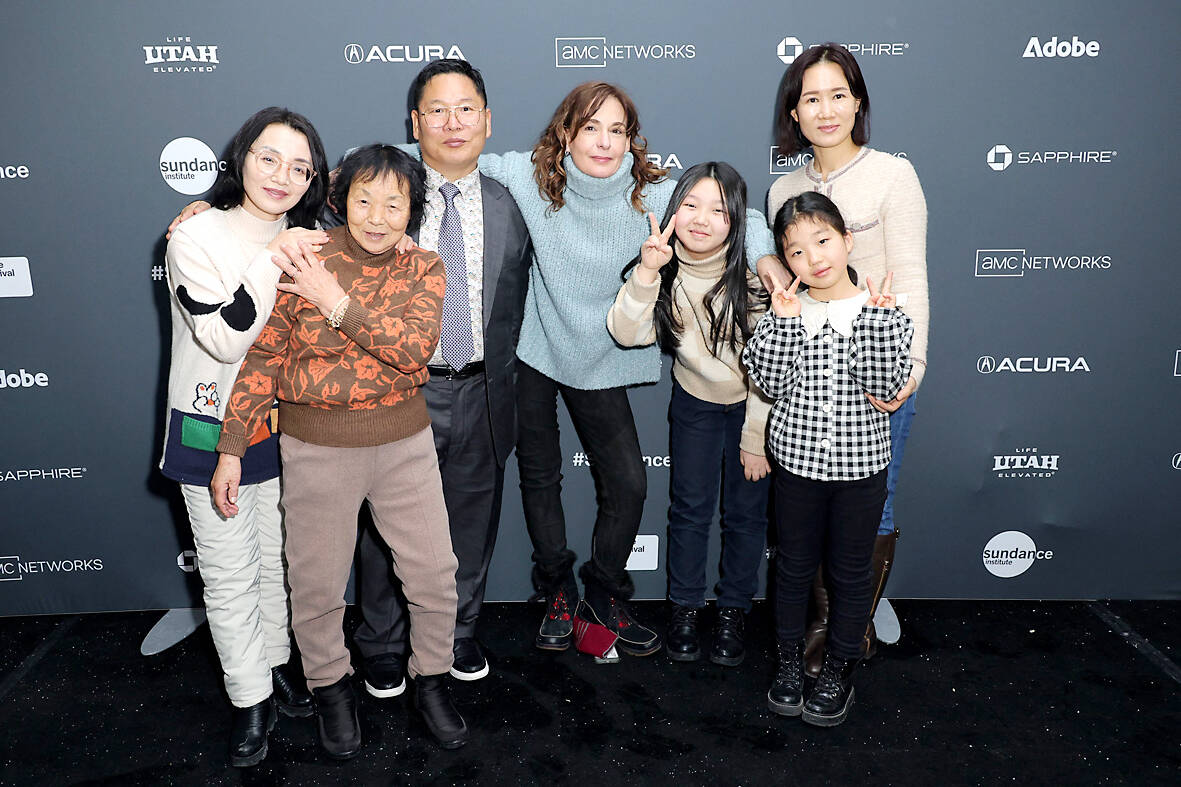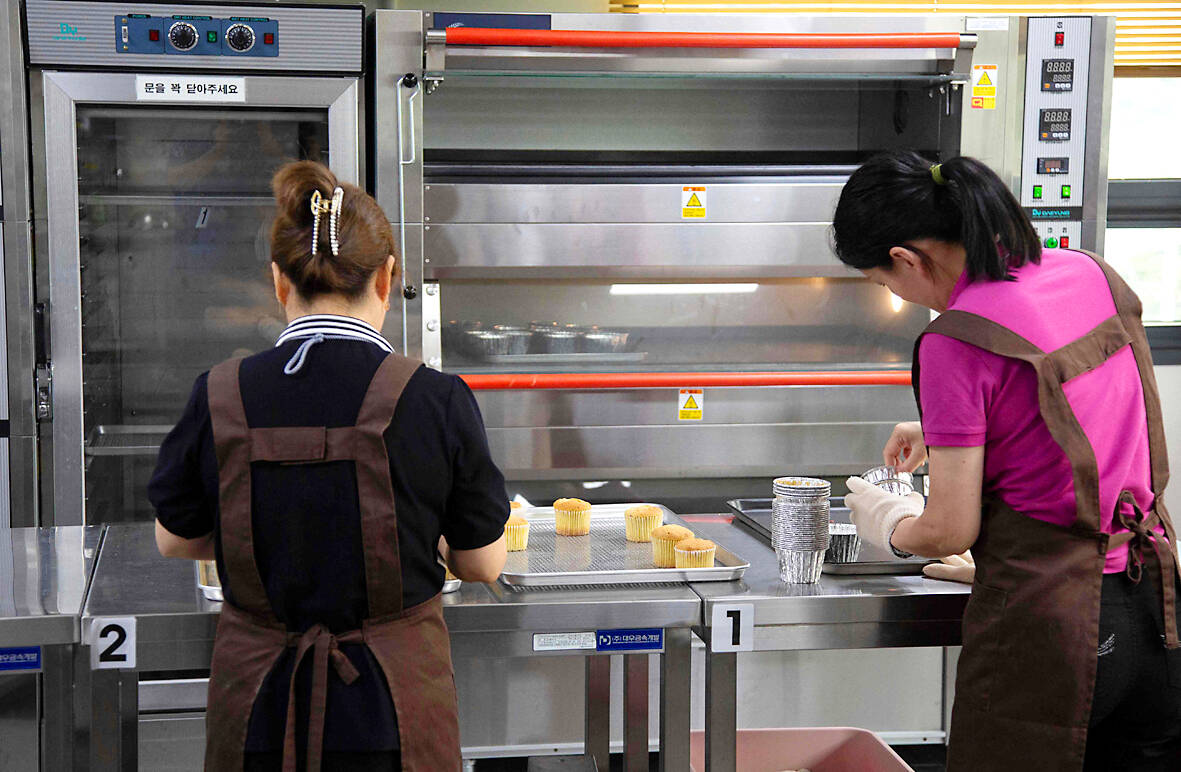Earning your subject’s trust is never easy for a documentary filmmaker — but it is even harder when they think you want to kill them.
That was the challenge faced by US director Madeleine Gavin, whose movie Beyond Utopia follows newly escaped North Korean defectors as they flee.
These include the Roh family and their elderly grandmother, who Gavin met just weeks after they bolted from their deeply repressive, reclusive homeland, and lifetimes of being fed propaganda.

Photo: AFP
“I’ll never forget the way that she would look at me,” Gavin said.
In their minds at the time, “Americans practically only exist to make North Koreans miserable and to kill and attack North Koreans.
“We aren’t even human beings ... that’s what they’ve been taught.”

Photo: AFP
Soon after the Rohs sneaked across the closely guarded border into China, a local farmer connected them to an “Underground Railroad” for defectors, run by a South Korean pastor whom Gavin happened to be filming.
The pastor arranged for the family to travel in secret through Communist-ruled China, Vietnam and Laos, braving police checkpoints and a treacherous jungle border crossing.
The movie uses footage shot in China by the pastor’s “brokers” before Gavin was able to meet and film them face-to-face herself in Southeast Asia.
At first, Gavin felt “a deep distrust and suspicion” from the family.
But despite the powerful brainwashing they had endured in North Korea, even the 80-year-old grandmother’s attitude quickly began to shift as she saw the outside world with her own eyes.
“She was having none of it ... She’d always been told that relative to the rest of the world, North Koreans are the luckiest people on Earth,” said Gavin.
“Then to be seeing a world where there are animals, and life, and toilets, even! We were a piece of that puzzle.”
When Gavin first set out to make her film — in US theaters yesterday — it focused on North Koreans already living for many years in South Korea.
On arrival in the south, many defectors attend a “resettlement facility” where they are taught about the rest of the world, the lies of Kim Jong Un’s brutal regime, and basic modern practices such as how to use an ATM.
But after meeting Pastor Kim Sung-eun, a prominent South Korean missionary involved in the underground network that brings escapees to the South, Gavin restructured the film to chronicle two families as they flee the north.
The documentary follows Soyeon Lee, a mother who has long since escaped North Korea, but is now trying to smuggle out the son she had to leave behind.
Tragedy strikes as he is captured in China, and sent back to North Korea to face punishment.
Filming the mother’s anguish “was really the most difficult thing,” Gavin said. “What she has gone through and continues to go through is the worst thing that anyone can go through.”
The other part of the film follows the Roh family as they embark on their harrowing, 3,000-mile overland journey toward Thailand, and freedom.
One slip-up could see them also repatriated to North Korea, lending the documentary a dramatic tension more associated with Hollywood thrillers.
But Gavin also set out to make something “experiential and present tense,” which gives a “voice to actual North Koreans,” whose country is mainly known to the rest of the world for its nuclear arsenal and terrifying politics.
Even as they flee, the Rohs express a complex mixture of emotions, from wonder and excitement, to anger at what they have long been deprived of, to shame.
Despite witnessing prosperity unthinkable back home, the grandmother “did not let up on the idea that Kim Jong Un was this incredible person, with the most difficult job before him,” Gavin said. “She had enormous guilt for leaving, and that anyone who defects is basically abandoning him, and how heartbreaking it is for him.”
Perhaps more powerful still is the family’s homesickness for the friends, neighbors, traditions and land they left behind.
The movie includes — and ends with — footage secretly shot inside North Korea and smuggled out by the pastor’s network, showing everything from the country’s barbaric gulags to the bleakness of everyday life.
“As Grandma says at the end of the film, ‘we’re so lucky, but it keeps me up at night thinking about the people who are still there,’” Gavin said.
“And so I wanted to leave the film remembering those people. Because those people are there, and they need us to help bring their voices forward.”

The Democratic Progressive Party (DPP), Chinese Nationalist Party (KMT), and the country’s other political groups dare not offend religious groups, says Chen Lih-ming (陳立民), founder of the Taiwan Anti-Religion Alliance (台灣反宗教者聯盟). “It’s the same in other democracies, of course, but because political struggles in Taiwan are extraordinarily fierce, you’ll see candidates visiting several temples each day ahead of elections. That adds impetus to religion here,” says the retired college lecturer. In Japan’s most recent election, the Liberal Democratic Party lost many votes because of its ties to the Unification Church (“the Moonies”). Chen contrasts the progress made by anti-religion movements in

Taiwan doesn’t have a lot of railways, but its network has plenty of history. The government-owned entity that last year became the Taiwan Railway Corp (TRC) has been operating trains since 1891. During the 1895-1945 period of Japanese rule, the colonial government made huge investments in rail infrastructure. The northern port city of Keelung was connected to Kaohsiung in the south. New lines appeared in Pingtung, Yilan and the Hualien-Taitung region. Railway enthusiasts exploring Taiwan will find plenty to amuse themselves. Taipei will soon gain its second rail-themed museum. Elsewhere there’s a number of endearing branch lines and rolling-stock collections, some

This was not supposed to be an election year. The local media is billing it as the “2025 great recall era” (2025大罷免時代) or the “2025 great recall wave” (2025大罷免潮), with many now just shortening it to “great recall.” As of this writing the number of campaigns that have submitted the requisite one percent of eligible voters signatures in legislative districts is 51 — 35 targeting Chinese Nationalist Party (KMT) caucus lawmakers and 16 targeting Democratic Progressive Party (DPP) lawmakers. The pan-green side has more as they started earlier. Many recall campaigns are billing themselves as “Winter Bluebirds” after the “Bluebird Action”

Feb 24 to March 2 It’s said that the entire nation came to a standstill every time The Scholar Swordsman (雲州大儒俠) appeared on television. Children skipped school, farmers left the fields and workers went home to watch their hero Shih Yen-wen (史艷文) rid the world of evil in the 30-minute daily glove puppetry show. Even those who didn’t speak Hoklo (commonly known as Taiwanese) were hooked. Running from March 2, 1970 until the government banned it in 1974, the show made Shih a household name and breathed new life into the faltering traditional puppetry industry. It wasn’t the first